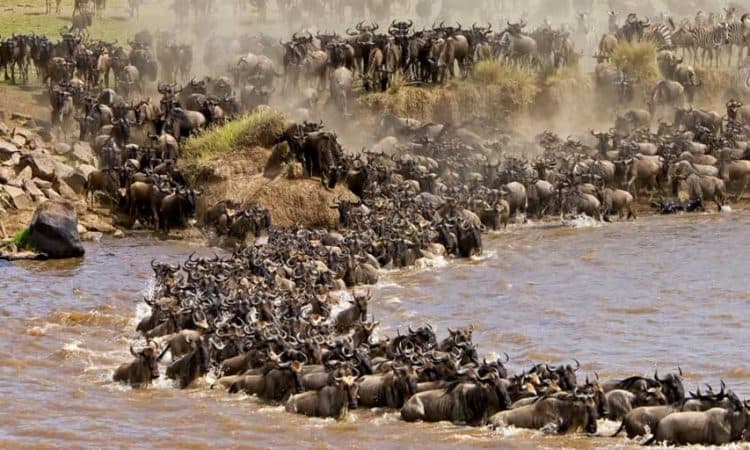We're loading the full news article for you. This includes the article content, images, author information, and related articles.
A Maasai Mara tour guide claims Tanzanian officials are using helicopters and jeeps to stop wildebeests from crossing into Kenya, leading to fewer sightings of the famous Mara River migration and raising fears for the tourism industry.

Maasai Mara, Kenya — 2025-09-14 10:00 EAT. A veteran Maasai Mara tour guide has accused Tanzanian authorities of using helicopters and jeeps to prevent wildebeests from crossing into Kenya during the annual migration, triggering debate over cross-border wildlife management and tourism revenues
Charles Lukokolo, a guide with 30 years’ experience, told NTV that tourists now wait for hours at the Mara River without witnessing the famed crossings because animals retreat before entering Kenya
He alleged that Tanzanian officials deliberately herd the wildebeests back, depriving Kenya of the dramatic scenes that attract thousands of visitors each year
The wildebeest migration is a global tourism highlight, with over 1.5 million animals moving between Tanzania’s Serengeti and Kenya’s Maasai Mara.
Lukokolo said crossings once occurred multiple times daily, drawing predators like lions and cheetahs for spectacular hunting scenes
In recent years, he claims, the herds “sense hostility” and turn back, making sightings increasingly rare.
Tour operators in Kenya: Fear declining crossings could hurt tourism revenues, a key pillar of Kenya’s economy.
Wildlife experts: Caution that migration patterns depend on rainfall, grazing conditions, and human activity, urging science-based assessments before drawing conclusions.
Kenyan officials: Have called for dialogue with Tanzanian counterparts to ensure the shared Mara–Serengeti ecosystem is protected.
Tourism economy: Fewer crossings risk reducing Kenya’s tourism earnings, especially during the July–October peak season.
Diplomatic relations: Allegations could strain Kenya–Tanzania ties if not addressed through conservation agreements.
Ecosystem health: Cross-border coordination is vital for sustaining predator-prey dynamics and preventing habitat degradation.
Any official response from Tanzania’s wildlife authorities.
Plans for joint conservation frameworks along the Mara–Serengeti corridor.
Tourism data on visitor numbers and revenue impacts if sightings continue to decline.
Keep the conversation in one place—threads here stay linked to the story and in the forums.
Sign in to start a discussion
Start a conversation about this story and keep it linked here.
Other hot threads
E-sports and Gaming Community in Kenya
Active 9 months ago
The Role of Technology in Modern Agriculture (AgriTech)
Active 9 months ago
Popular Recreational Activities Across Counties
Active 9 months ago
Investing in Youth Sports Development Programs
Active 9 months ago